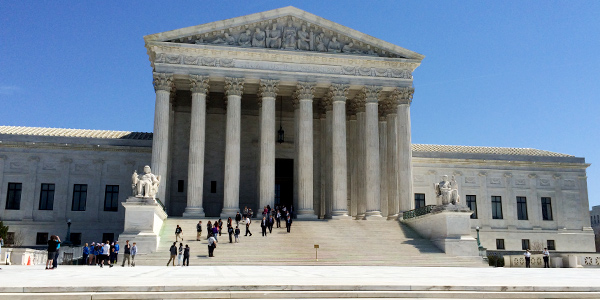By Rich Heidorn Jr.
The U.S. Supreme Court on Monday declined to hear challenges to Illinois’ and New York’s zero-emission credit payments to nuclear plants.
The court denied the Electric Power Supply Association’s petitions for certiorari without comment. The decision left standing last September’s rulings by the 2nd and 7th U.S. Circuit Courts of Appeals that rejected claims that New York’s and Illinois’ ZECs intrude on FERC jurisdiction (18-868 Electric Power Supply Assn. v. Star, Anthony M., et al.; 18-879 Electric Power Supply Assn. v. Rhodes, John B., et al.).
EPSA had been joined by NRG Energy and Calpine in its challenges. The challengers also won support from Courts Misread Hughes on Nuke Subsidies, Supreme Court Told.)

Supreme Court | © RTO Insider
The court’s unsurprising decision — it hears only a small percentage of the cases on which it is petitioned — was a victory for Exelon, the nation’s largest nuclear operator. The company is currently lobbying for nuclear subsidies in Pennsylvania. (See related story, Nuke Talks Continue in Pa. Assembly.)
FirstEnergy also is supporting the legislative effort in Pennsylvania and a similar bill introduced Friday in Ohio to support its Davis-Besse and Perry plants.
New Jersey and Connecticut have also approved nuclear subsidies.
Hughes Ruling
EPSA’s supporters had contended the appellate courts misinterpreted the Supreme Court’s 2016 ruling in Hughes v. Talen, in which the court unanimously rejected Maryland’s contract-for-differences with a natural gas plant.
The court provided state regulators guidance for crafting subsidy programs in the future, saying it rejected Maryland’s initiative only because it was tied to PJM capacity prices. Monitoring Analytics, PJM’s Monitor, contended that legislators could easily avoid the “explicit tether” the court rejected in Hughes.
ClearView Energy Partners said the court’s refusal to hear the New York and Illinois challenges “may cement the ‘fatal defect’” in Hughes.
“In other words, the Supreme Court has not changed its stance that [states] have legal authority to favor certain resources so long as their programs do not require those resources to participate in wholesale electricity markets (even if, as a practical matter, those resources do participate in the markets),” ClearView said.
“Today’s decision likely leaves ZEC opponents looking to the market operators to propose tariff reforms that FERC can approve as the source for relief,” ClearView continued, referring to efforts to ISO-NE’s implementation of a minimum offer price rule (MOPR) for subsidized resources and FERC’s June 2018 order requiring PJM to strengthen its MOPR to address nuclear and renewable subsidies. (See FERC Orders PJM Capacity Market Revamp.)
EPSA Seeks FERC Action
EPSA CEO John Shelk said FERC — which had argued against EPSA’s claim for federal pre-emption of the Illinois law — should now act to protect wholesale market prices from being distorted by nuclear subsidies.
“Even though … FERC determined state nuclear subsides and others impair the integrity of PJM’s wholesale market, FERC has yet to fashion a solution. That is hardly what FERC told the court it would do to protect markets,” Shelk said in a statement.
“The problem has only gotten worse since the June 29, 2018, order, with emboldened nuclear subsidy seekers now pounding on the doors of state legislatures in Ohio, Pennsylvania and again in Illinois for a second helping. FERC told the appeals court the solution lies with FERC; the time for FERC to live up to that promise is now.”
The Electricity Consumers Resource Council (ELCON), which represents industrial customers, said it was disappointed in the ruling. “Subsidizing uneconomic power sources undercuts the competitiveness of U.S. manufacturing, which must maintain a global fuel cost advantage,” CEO Devin Hartman said in a statement.
Environmental Defense Fund Senior Attorney Michael Panfil praised the ruling as “great news for all states that are working to create their best possible climate and clean energy policies.”
“In case after case, our courts have confirmed that states have the fundamental legal authority to craft clean energy policies, address climate change, and work to reduce unhealthy air pollution in order to safeguard the welfare and well-being of their people,” he said. “The Supreme Court’s order today puts any lingering questions to rest.”




